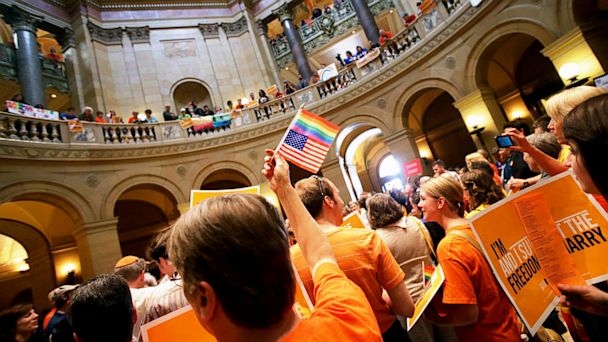Minnesota Senate Votes to Allow Same-Sex Marriage

(Image Credit: Jim Mone/AP Photo)
After a day of passionate yet respectful speeches on both sides of the issue, the Minnesota State Senate voted 37-30 to legalize same-sex marriage today, overcoming the last hurdle before the bill moves on to Gov. Mark Dayton, who supports giving same-sex couples the freedom to marry.
Minnesota would join 11 other states and the District of Columbia in legalizing same-sex marriage, meaning that about 18 percent of the country's population has the option to marry regardless of gender.
As in the case of several other states that have passed similar measures in the past two months, one Minnesota lawmaker brought a personal connection to the fight.
State Sen. Scott Dibble, who championed the bill, married his husband, Richard, in California in 2008, but the state he represents has not recognized their marriage. Dibble posted the story of their relationship and photos of the wedding on his website.
READ MORE: READ MORE: Obama's Evolution on Gay Marriage
"We were lucky to be able marry during the narrow window in 2008 when all marriages were legal in California," Dibble wrote. "The effect of that occasion was more profound than we could have imagined. Our family, who had always been loving and supportive, understood us and had a connection to our relationship in a way that just didn't exist previously. Marriage is simply meaningful in ways that nothing else is."
Several senators told stories of gay brothers, sisters and friends during the debate leading up to the vote on the Senate floor.
Sixteen years ago, a personal plea failed to win over Minnesota legislators. Then-Senate President Allan Spear, who died in 2008, argued in 1997 against the state's then-pending gay marriage ban by speaking openly of his relationship with his gay partner on the Senate floor. Spear's impassioned plea fell on deaf ears that day, and the legislation became law of the land.
But almost two decades later, "Minnesota nice" now extends to same-sex couples. The first hint that this day would come for the North Star state appeared in November when voters rejected a constitutional amendment to limit marriage to opposite-sex couples.
READ MORE: Fourth-Grader's Pro Gay Marriage Essay Goes Viral
That amendment started in the State Senate two years ago. It passed in the Senate and the House and was presented to the governor less than one month after its introduction.
The 16-month battle leading up to its ultimate failure among Minnesotans was one of the most expensive in the state, according to Minnesota Public Radio.
"The main group opposing the amendment, Minnesotans United for All Families, brought in nearly $10 million in cash donations. Minnesota for Marriage, the group leading the fight to pass the amendment, raised more than $5 million," MPR reported the day after the election.
In 2005, then-state Sen. Michele Bachmann gained recognition when she introduced a similar measure with a constitutional ban on same-sex marriage and attempted to have it fast-tracked through the state Senate. The proposal failed, and the billed died in the Minnesota Senate Judiciary committee.
Bachmann has stayed out of the fray this time around. Her office did not respond to a request for comment on today's vote.
Shortly before the vote came in, Bachmann tweeted her support for traditional marriage.
I'm proud to have introduced the original traditional marriage amendment, and I thank all Minnesotans who have worked so hard on this issue.
— Michele Bachmann (@MicheleBachmann) May 13, 2013
The bill passed in the Minnesota Senate today is slightly different from other states because it specified that it pertains to "civil marriage," whether in same-sex or opposite-sex marriages.
READ MORE: Poll Finds Majority Acceptance of Gays
"This is done to emphasize that our laws and our statutes only pertain to the legal aspects of marriage, maintain that distinction so we can look to the law and know that it does not intrude on religious beliefs and practice," Sen. Dibble said on the Senate floor Monday. "It simply affirms what was already true and has always been true, that the laws that pertain to marriage are laws that only deal with civil matters and don't reach into private firmly held religious beliefs or practice."
Jake Loesch, communications director of the group that campaigned in favor of the bill Minnesotans United, said the state Senate's decision was "be incredibly significant in the lives of thousands of Minnesota families."
"Same-sex couples pay taxes, work, and run businesses in Minnesota. They raise families, serve in the military, and are active community members - and they deserve to be treated the same as anyone else," Loesch wrote in an email to ABC News today. "I think there's certainly been a shift in public opinion regarding the freedom to marry for same-sex couples in Minnesota, and that's due largely to the thousands of LGBT Minnesotans and families who've stepped up over the last several years to share their own personal stories about why marriage matters."
All of New England has legalized same-sex marriage. Minnesota is the second Midwestern state to do so after Iowa, but the third might not be so far behind.
Illinois Gov. Pat Quinn urged representatives in the State House to send him the bill passed in the Senate on Valentine's Day that would legalize gay marriage.
"It's time to vote," Quinn said Thursday, the Chicago Tribune reported. "Illinois passing marriage-equality into law, I think, sends a great signal to the people of our state and the people of America. So it's important to Illinois [that] the House of Representatives get going."